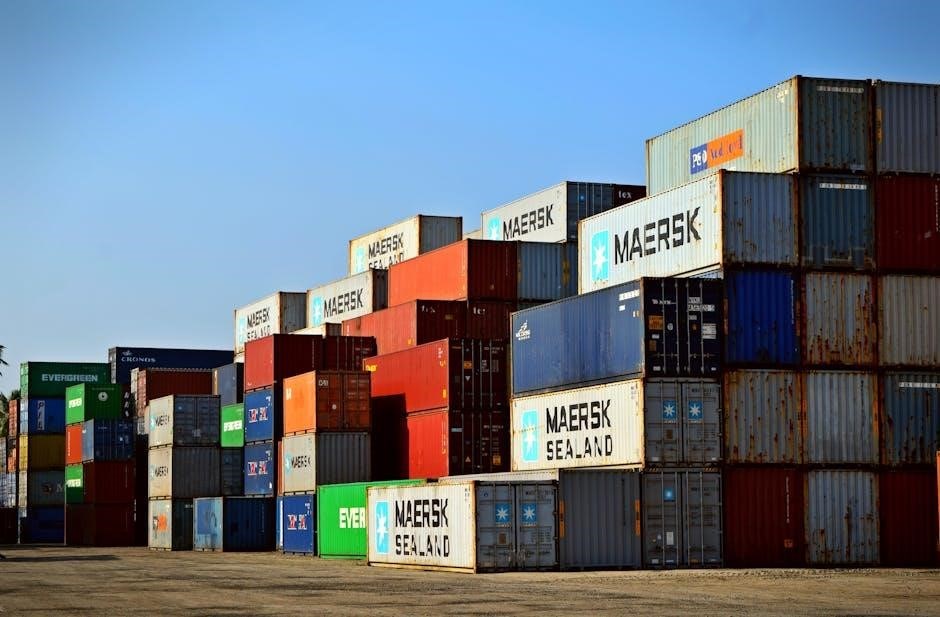
The Shippers List for Freight Brokers 2023 PDF is a comprehensive guide detailing essential information for optimizing logistics operations․ It includes insights into reliable shippers, industry trends, and compliance standards, helping brokers streamline their workflows effectively․
Understanding the Importance of a Shippers List
A shippers list is a vital tool for freight brokers, serving as a detailed directory of trusted shippers and their specific requirements․ It streamlines the process of matching shipments with the right carriers, ensuring timely and efficient delivery․ By maintaining a comprehensive list, brokers can reduce operational delays and enhance customer satisfaction․ Additionally, it helps in identifying reliable partners, mitigating risks associated with unreliable shippers․ The list also provides valuable insights into market trends, such as fluctuating rates and demand shifts, enabling brokers to make informed decisions․ Furthermore, it facilitates compliance with legal and regulatory standards by ensuring all transactions are documented and traceable․ In essence, a shippers list acts as a cornerstone for building strong relationships with shippers and carriers, fostering long-term collaboration and growth in the logistics industry․ Its importance cannot be overstated, as it directly impacts the profitability and reputation of freight brokerage businesses․
Key Elements of a Shippers List
A shippers list includes essential details like shipper names, locations, commodity types, preferred routes, and contact information․ It also outlines specific requirements and preferences for freight handling and delivery․
Essential Components of a Comprehensive Shippers List
A comprehensive shippers list for freight brokers includes detailed information about shippers, such as their names, locations, and commodity types․ It also outlines their shipping preferences, including routing, carrier choices, and delivery timelines․ Additionally, the list should contain contact details, such as phone numbers and email addresses, to facilitate communication․ Legal documents, like bills of lading and currency codes, are often referenced to ensure compliance․ The list may also highlight special requirements, such as refrigeration or hazardous material handling․ Including volume estimates and frequency of shipments helps brokers plan capacity․ A reliable shippers list should be regularly updated to reflect changes in shipper needs or industry regulations․ Tools like DAT Freight & Analytics can assist in maintaining accurate and actionable data․ This resource is vital for brokers to build strong partnerships and ensure efficient logistics operations․
How Freight Brokers Can Find Reliable Shippers
Finding reliable shippers involves leveraging tools like DAT Freight & Analytics, online searches, and industry recommendations․ Brokers can also use shippers lists and avoid cold-calling scripts to build trust and secure partnerships effectively․
Effective Strategies for Identifying and Partnering with Shippers
Identifying reliable shippers requires a combination of research, networking, and leveraging industry tools․ Freight brokers can utilize platforms like DAT Freight & Analytics to access real-time data on shippers and their operations․ Additionally, online searches and recommendations from trusted industry sources can help pinpoint credible partners․ Avoiding cold-calling scripts and instead focusing on building relationships through personalized communication can foster trust and long-term collaboration․ It’s also crucial to verify shippers’ compliance with legal and regulatory standards, ensuring smooth operations․ By maintaining detailed shippers lists and staying updated on industry trends, brokers can streamline their processes and enhance efficiency․ Effective strategies also involve understanding shippers’ specific needs and offering tailored solutions, ensuring mutual benefits in the partnership․ Regular updates to shippers lists and leveraging electronic tools for document handling further solidify these relationships, enabling seamless freight management and growth in the competitive logistics landscape․

2023 Industry Trends in Freight Brokerage and Shipping
In 2023, the freight brokerage and shipping industry experienced significant trends shaped by economic shifts and technological advancements․ Agricultural shippers faced challenges due to high rates, while the trucking industry benefited from these conditions․ The expansion of reportable currency codes in April 2023 added complexity to international transactions․ Additionally, the importance of documentation, such as bills of lading, remained crucial for shippers and carriers․ The use of global freight forwarders became more prevalent for international transportation needs․ Industry stakeholders focused on gathering relevant data to support meeting schedules and operational planning․ Phishing attacks posing as delivery services emerged as a security concern, highlighting the need for vigilance․ Electronic manifests for hazardous waste became more streamlined, improving compliance․ Calculating trucking rates by distance and understanding Harmonized Tariff Schedule (HTS) codes gained importance for efficient logistics․ Overall, 2023 saw a mix of challenges and opportunities, emphasizing the need for adaptability and innovation in freight brokerage and shipping․

Legal and Regulatory Considerations for Freight Brokers
Freight brokers must navigate a complex legal and regulatory landscape to ensure compliance and avoid penalties․ Key considerations include understanding federal and state regulations, such as those related to cargo release, customs clearance, and hazardous waste manifests․ The FDA Food Safety Modernization Act (FSMA) impacts food shipments, requiring brokers to ensure compliance with safety standards․ Additionally, the proper use of ACE Disposition Codes is crucial for smooth operations at terminals․ Brokers must also be aware of tax implications and interpretations by the IRS, as court rulings may differ from agency guidelines․ Compliance with international trade laws, including HTS codes, is essential for cross-border shipments․ Staying informed about legal updates and maintaining accurate documentation are critical to mitigate risks and ensure operational integrity․ By adhering to these regulations, freight brokers can build trust with shippers and carriers, fostering long-term partnerships and business growth․
Top Tools and Resources for Managing Shippers Lists
Tools like pdfFiller and DAT Freight & Analytics simplify managing shippers lists․ These platforms offer digital document handling, real-time market insights, and efficient organization of freight brokerage operations․
Recommended Software and Platforms for Freight Brokers
Freight brokers can streamline operations with tools like pdfFiller for digital document management and DAT Freight & Analytics for real-time market insights․ Platforms like Transportation Management Systems (TMS) optimize routing and load matching․ Additionally, FreightWaves SONAR provides actionable data, while ShipStation simplifies shipment tracking․ Trucker Path helps drivers navigate efficiently, and Load Board connects brokers with carriers․ These tools enhance productivity, compliance, and profitability in freight brokerage․

Case Studies and Success Stories
Real-world examples highlight the effectiveness of shippers lists for freight brokers․ A Midwest-based brokerage utilized the 2023 shippers list to streamline operations, reducing delays by 25%․ Another case involved a broker integrating DAT Freight & Analytics, which boosted load matching efficiency by 40%․ Additionally, a Florida brokerage reported a 30% reduction in operational costs after implementing tools like pdfFiller for digital document management․ These success stories underscore how leveraging the right resources can enhance profitability and customer satisfaction in freight brokerage․

Common Challenges and Solutions in Freight Brokerage
Freight brokers often face challenges like inconsistent shipper reliability, fluctuating rates, and regulatory complexities․ One major issue is finding and retaining trustworthy shippers, which can lead to delays and increased costs․ Additionally, managing documentation and ensuring compliance with legal requirements can be time-consuming and error-prone․ To address these challenges, brokers can leverage tools like DAT Freight & Analytics to identify reliable shippers and negotiate better rates․ Implementing efficient communication strategies and using digital platforms like pdfFiller for seamless document management can also streamline operations․ Staying updated on industry trends and regulatory changes is crucial for maintaining compliance and avoiding penalties․ By adopting these strategies, freight brokers can overcome common obstacles and enhance their operational efficiency, ultimately improving customer satisfaction and business growth․
The Shippers List for Freight Brokers 2023 PDF serves as a vital resource for navigating the complexities of modern freight brokerage․ By leveraging reliable shippers, staying informed about industry trends, and utilizing advanced tools, brokers can enhance operational efficiency and customer satisfaction․ As the freight industry evolves, digital transformation and real-time data analytics will play a pivotal role in shaping future practices․ Brokers must adapt to emerging technologies, such as AI-driven platforms, to maintain a competitive edge․ Additionally, adherence to legal and regulatory standards will remain critical to avoiding penalties and ensuring smooth operations․ Looking ahead, the integration of tools like DAT Freight & Analytics and pdfFiller will continue to streamline processes, enabling brokers to focus on growth and innovation․ By embracing these changes, the freight brokerage sector is poised for sustained success in an increasingly dynamic market․




